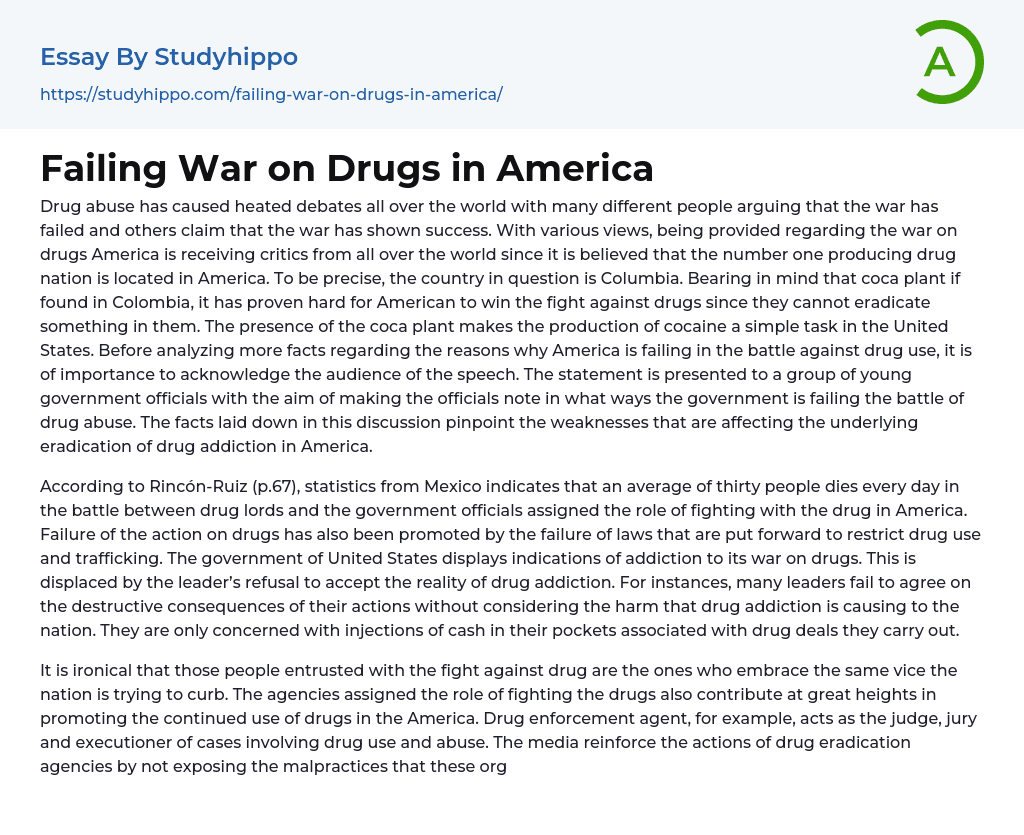In the ongoing global discussions about drug abuse, there are contrasting viewpoints regarding the effectiveness of the war against drugs. America, recognized as a major producer of drugs, is under scrutiny from critics around the world.
In Columbia, a country abundant with coca plants, the battle against drugs is challenging for America as complete eradication is not feasible. Consequently, cocaine production becomes more accessible within the United States. This speech targets young government officials to raise their awareness of the government's shortcomings in combating drug abuse. The conversation emphasizes the weaknesses impeding efforts to eliminate drug addiction in America.
According to Rincon-Ruiz (p.67), statistics from Mexico reveal that there is an average of thirty daily deaths in the ongoing conflict between drug lords and government officials combatting drugs in America. The inefficacy
...of drug control measures is also linked to the failure of drug laws. The dedication of the US government to the war on drugs appears dubious as leaders deny the truth about drug addiction, disregarding the destructive consequences of their actions and prioritizing personal gains from drug deals instead of acknowledging the harm inflicted upon the nation by drug addiction.
It is ironic that those entrusted with the fight against drugs are the same individuals who engage in the very vice the nation is attempting to eliminate. The agencies tasked with combating drug use in America also greatly contribute to promoting its continued existence. For instance, drug enforcement agents, acting as judges, juries, and executioners, handle cases involving drug use and abuse. The media further support the actions of these drug eradication organizations by failing to expose their misconduct (Robertson, Angela M., et al., p.1).
Politicians exploit public fears and promote themselves to demonstrate active efforts in addressing addiction-related issues by enacting stringent laws.
There is a lack of compliance due to politicians passing laws without an effective enforcement system. Government officials have created a concerning loophole by classifying certain hard drugs as having medicinal benefits. Despite prioritizing citizens' well-being, the government's efforts to combat drug-related crimes have resulted in numerous deaths caused by drug trafficking and abuse. Data from around the world shows that Colombia, Honduras, Mexico, El Salvador, and Venezuela are the most dangerous countries in Latin America - the world's most violent region. Conflicts between drug cartels and government anti-drug forces account for approximately half of the deaths in this region (Rincon-Ruiz, p. 61).
The government is confronted with a moral quandary as it grapples with drug-related deaths while attempting to combat drugs. It must decide between eradicating drugs and the accompanying loss of life. Though it is ethically correct for the government to fight against drugs, the adverse effects have impeded necessary actions. Consequently, the government has taken steps such as criminalizing drug producers and incarcerating numerous drug dealers.
Despite proposing a solution to combat drug-related issues, organized crime factions involved in the drug trade have still managed to amass substantial profits. These profits are estimated to be around $320 billion annually (Rincon-Ruiz, p.62). The increased benefits enable drug cartels to bribe politicians, police officers, and judges, enabling them to sustain their unlawful operations. Furthermore, the war against substance abuse in America has proven unsuccessful for several reasons. Firstly, it lacks a comprehensive strategy to eradicate the availability of hard drugs in the global market. Although measures like fumigation
and crop substitution programs have been implemented to hinder the production of cocaine, heroin, and marijuana, they have not significantly impacted overall drug manufacturing.
Despite their original intention to address drug use, these programs have actually worsened the living conditions of impoverished communities and drug-cultivating farmers. Additionally, counter-narcotics policies have proven ineffective in regulating the transportation of narcotics from Latin America to northern regions of America. This lack of effectiveness is demonstrated by the fact that 90% of drugs consumed in the US are sourced from Colombia (Bouley, p. 169). The evidence presented in this essay clearly indicates that the war on drugs in America is failing; however, it should be noted that this does not mean the government should abandon its efforts to control drug usage.
Instead of seeing it as a failure, the American people have an opportunity and milestone to develop more effective strategies to combat drug abuse. The American government would greatly benefit from implementing the recommendations made by the Global Commission on Drug Policy. These recommendations include:
- Making evidence-based prevention and harm reduction initiatives the cornerstone of drug policy.
- Ensuring access to drugs that can alleviate unnecessary pain and suffering for individuals undergoing rehabilitation.
- Putting an end to criminalization and imprisonment for drug use and personal possession.
- Cocaine essays
- Drug Abuse essays
- Teenage Drug Abuse essays
- Why Marijuana Should Be Legalized essays
- Animal Cruelty essays
- Charles Manson essays
- Crime Prevention essays
- Crime scene essays
- Criminal Justice essays
- Criminology essays
- Cyber Crime essays
- Damages essays
- Detention essays
- Distracted Driving essays
- Drug Trafficking essays
- Drunk Driving essays
- Forensic Science essays
- Gang essays
- Hate Crime essays
- Homicide essays
- Identity Theft essays
- Juvenile Crime essays
- Juvenile Delinquency essays
- Juvenile Justice System essays
- Law Enforcement essays
- Murder essays
- Organized Crime essays
- Penology essays
- Piracy essays
- Prison essays
- Property Crime essays
- Prostitution essays
- Punishment essays
- Punishments essays
- Rape essays
- Robbery essays
- Serial Killer essays
- Sexual Assault essays
- Sexual Assault on College Campuses essays
- Sexual Harassment essays
- Sexual Offence essays
- Stealing essays
- Surveillance essays
- Ted Bundy essays
- Victim essays
- Violent crime essays
- White Collar Crime essays
- Agreement essays
- Business Law essays
- Common Law essays




